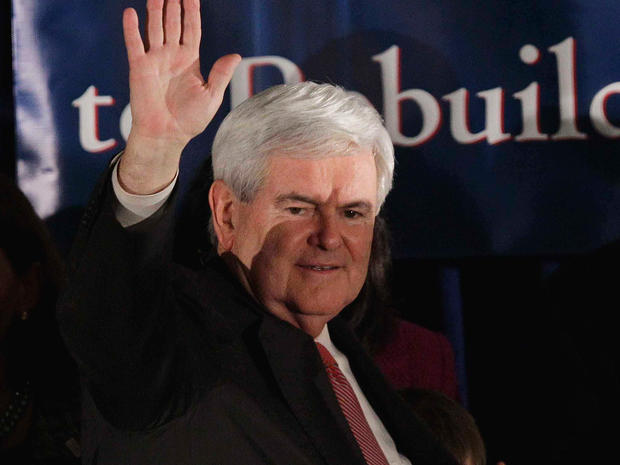Former Reagan aide: Gingrich "spewed insulting rhetoric" at Reagan
On the campaign trail, former House Speaker Newt Gingrich has made a point of touting his credentials as a "Reagan Republican." But Elliott Abrams, who served as an assistant secretary of state in the Reagan administration, says Gingrich was not nearly the friend to Reagan's administration he claims.
According to Abrams, writing in the conservative National Review magazine, Gingrich's claims of having "worked with President Reagan to change things in Washington" - among others - are "misleading at best."
Gingrich was elected to the House of Representatives in 1978 and served in Congress for the duration of Reagan's presidency. But Abrams writes that even while Gingrich often voted to support the president, he "spewed insulting rhetoric at Reagan, his top aides, and his policies to defeat Communism" in the process.
"Gingrich was voluble and certain in predicting that Reagan's policies would fail, and in all of this he was dead wrong," Abrams writes.
Citing contentious Cold War-era debates over stopping the spread of communism, Abrams writes that Gingrich would "attack" Reagan in his rhetoric before eventually voting for his policies.
"He voted with the caucus, but his words should be remembered, for at the height of the bitter struggle with the Democratic leadership Gingrich chose to attack . . . Reagan," he says.
Abrams remembers a particular example:
The best examples come from a famous floor statement Gingrich made on March 21, 1986. This was right in the middle of the fight over funding for the Nicaraguan contras; the money had been cut off by Congress in 1985, though Reagan got $100 million for this cause in 1986. Here is Gingrich: "Measured against the scale and momentum of the Soviet empire's challenge, the Reagan administration has failed, is failing, and without a dramatic change in strategy will continue to fail. . . . President Reagan is clearly failing." Why? This was due partly to "his administration's weak policies, which are inadequate and will ultimately fail"; partly to CIA, State, and Defense, which "have no strategies to defeat the empire." But of course "the burden of this failure frankly must be placed first on President Reagan."
Abrams quotes Gingrich calling the Reagan administration's anti-communist efforts in the third world "pathetically incompetent"; as to his Afghanistan policy, Gingrich said it was characterized by "impotence [and] incompetence."
"Gingrich made these assaults on the Reagan administration just as Democratic attacks were heating up unmercifully," Abrams writes. "Far from becoming a reliable voice for Reagan policy and the struggle against the Soviets, Gingrich took on Reagan and his administration."
Abrams is the latest in a series of prominent Republicans to publicly criticize Gingrich in the wake of his recent popularity. Tom DeLay, the former Republican majority leader who served with Gingrich, on Wednesday questioned the candidate's credentials not just as a "Reagan conservative," but as a conservative at all.
"He's not really a conservative," DeLay said in a radio interview with the Michael Berry show. "I mean, he'll tell you what you want to hear, he has a sort of uncanny ability, sort of like Clinton, to feel your pain and know his audience and speak to his audience and fire them up, but when he was Speaker, he was erratic."
The criticisms reflect what appears to be a growing aversion to Gingrich's candidacy among many influential voices on the right. So far, the candidate has enjoyed little in the way of endorsements from national Republican leadership, and Romney - whose own support from the establishment has been tepid - has slowly been racking up support in the face of a Gingrich challenge.
Romney has sought to capitalize on the friction between Gingrich and the GOP establishment, and in a recent debate played up the idea that the former speaker was exaggerating his relationship with the former president.
"I mean, Mr. Speaker, it was -- you talk about all the things you did with Ronald Reagan and the Reagan revolution and the jobs created during the Reagan years and so forth," Romney said during a Republican debate in Charleston last week. "I mean, I looked at the Reagan diary. You're mentioned once in Ronald Reagan's diary... And in the diary, he says you had an idea in a meeting of young congressmen, and it wasn't a very good idea and he dismissed it. That's the entire mention. He mentions George Bush 100 times. He even mentions my dad once."
